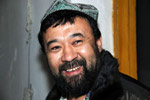Economy
China's trade surplus halves to $6.5b
Updated: 2011-02-14 17:01
(Agencies/China Daily)
China's exports surged in January in a sign of rebounding global demand and trade surplus fell to a nine-month low, possibly easing pressure on Beijing to allow its currency to rise.
China's global trade surplus fell 55 percent from a year earlier to $6.5 billion, customs data showed Monday. Exports soared 37.7 percent — more than double December's growth rate — to US$150.7 billion, while China's strong domestic demand drove explosive import growth of 53.5 percent to US$144.3 billion.
"Strength of exports, and even more so imports, points to solid demand — globally and domestically. The former bodes well for global recovery," said Dariusz Kowalczyk, senior economist for Credit Agricole CIB in Hong Kong, in a report.
Related readings:
China's trade surplus has narrowed in recent months as its rapid growth drives demand for foreign goods, while demand for its exports has weakened.
 China 2011 export growth to slow to 10%
China 2011 export growth to slow to 10% China's foreign trade jumps 44% in Jan
China's foreign trade jumps 44% in Jan
China's demand for imports has been driven by robust economic growth that hit 9.8 percent in the final quarter of last year. Growth is expected to moderate this year but remain strong as Beijing tries to steer the expansion to a more sustainable pace.
The country's surging exports fueled accusations that Beijing is keeping its yuan undervalued to give its exporters an unfair price advantage, leading to increasing pressures for China to let yuan appreciate.
The January trade data "will go some way to alleviate foreign pressure on China" to let the yuan rise faster against the US dollar, Kowalczyk said.
Beijing promised more exchange rate flexibility in June and the yuan has risen by about 3.6 percent against the US dollar since then. Analysts expect the currency to rise by about 5 percent this year.
Yuan rate at 'right level'
The exchange rate against the US dollar is currently at an appropriate level but could fluctuate in the future, Yi Gang, vice-governor of the central bank and head of the State Administration of Foreign Exchange, said on Sunday.
"In the future, as markets fluctuate and labor productivity changes, the rate will certainly show some fluctuation," he said at a seminar.
Last Thursday, the yuan's central parity rate rose to a record high of 6.5849 against the US dollar, after rising for three consecutive trading days, before declining to 6.5952 on Friday.
The yuan has appreciated about 3.6 percent against the dollar since mid-June. A report from the US Treasury said earlier that on an inflation-adjusted basis, the appreciation was even higher, at an annual rate of more than 10 percent.
The resilience of exporters to the rising yuan is stronger than previously estimated, which helps to pave the way for more currency reform to liberalize the yuan, said Lu Mai, secretary-general of the China Development Research Foundation (CDRF).
In 2007 and 2008, the Chinese currency rose by 7 percent annually against the US dollar, but China's GDP only declined by 0.28 percentage points, with inflation down by 0.42 points and workers' wages up by 0.07 points, according to CDRF research.
"The figures showed that progressive currency reform since July 2005 was successful, and the government should accelerate the reform and further free the yuan in the next five years to promote healthy, long-term economic development," Lu said.
China should keep the proportion of its trade surplus to GDP within 5 percent, and avoid further increasing its huge foreign exchange reserves to allow the currency to settle at a balanced level, he said.
China's foreign reserves rose to a record $2.85 trillion at the end of last year, an 18.7 percent increase year-on-year, according to statistics from the People's Bank of China, the central bank.
Yi said he took note of the CDRF findings, but emphasized that further moves depended on both the domestic and international economic situation and appropriate timing.
Lu Feng, an economist at Peking University, said now is the right time to deepen currency reform and let the yuan trade at a higher price as inflation is rising.
Analysts have predicted that the yuan will appreciate this year as inflation may see the government opt for a rising yuan to lower the cost of purchasing international commodities.
Lian Ping, chief economist at the Bank of Communications, predicted the yuan would rise by 5 to 7 percent in 2011.
Specials

Spring Festival
The Spring Festival is the most important traditional festival for family reunions.

Top 10
A summary of the major events both inside and outside China.

A role model
Alimjan Halik had been selected as the "Cyberspace Personality Who Moved the Hearts of the Chinese in 2010".